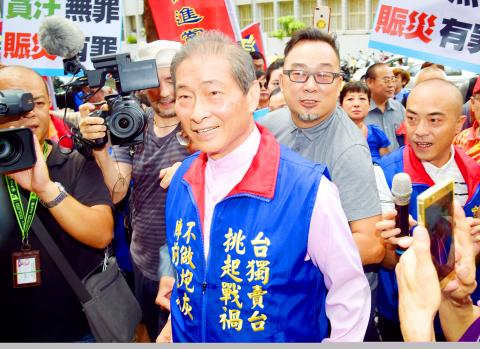Chinese Unity Promotion Party (CUPP) founder Chang An-le (張安樂) and his son, Chang Wei (張瑋), were yesterday released without bail after being summoned for questioning earlier in the day about funding sources for the party.
The CUPP has allegedly received money over the years from China to organize pro-China rallies in Taiwan and engage in violent activities against students and pro-Taiwan independence groups.
Leaving the Taipei District Prosecutors’ Office after questioning last night, Chang Wei said that although prosecutors have the right to investigate, “they are using the judicial process to torment us. It does not leave a good impression for society.”

Photo: Huang Yao-cheng, Taipei Times
Prosecutors on Wednesday had also summoned other CUPP executives — including Hu Ta-kang (胡大綱) and Wen Chih-cheng (溫吉成) — for questioning, after raiding the party’s head office in Taipei, Chang An-le’s residence in New Taipei City and other locations the day before.
They confiscated 14 boxes, including computers, data files and accounting records.
A crowd of more than 100 CUPP members and followers had gathered in front of the Taipei District Prosecutors’ Office in the afternoon, holding placards and shouting: “Chang An-le is not guilty.”
Prosecutors said they have gathered evidence and received tipoffs about money coming from Chinese officials and state-run agencies which were passed on to the Chang family’s Taolue Group, which has offices in China.
The funds were allegedly used to finance CUPP and Bamboo Union gang activities in Taiwan, they said.
Chang An-le, also known as White Wolf, was a former top leader of the Bamboo Union.
One of the probe’s focus was on CUPP leaders leading a money relief campaign after the Feb. 8 earthquake in Hualien, where they allegedly distributed NT$10 million (US$326,520 at the current exchange rate), by handing out “red envelopes” containing NT$10,000 each to 1,000 residents who were affected by the magnitude 6.4 quake.
Government officials and politicians have long questioned the CUPP’s sources of funds to finance activities ranging from the earthquake relief effort to protests and rallies, a number of which ended in violence.
Prosecutors have said that the CUPP’s records show that it had only received annual political donations of between NT$1 million and NT$2 million over the past five years.
“This is a big joke, for the judiciary to focus on our earthquake relief effort. It implies that donating money to help earthquake victims constitutes a crime, but people who are engaged in corruption are not guilty,” Chang An-le said yesterday.
He told reporters that the Taiwanese independence movement would cause war to break out.
“These people are pushing for independence, but what they want is to sell out Taiwan,” he said.

A year-long renovation of Taipei’s Bangka Park (艋舺公園) began yesterday, as city workers fenced off the site and cleared out belongings left by homeless residents who had been living there. Despite protests from displaced residents, a city official defended the government’s relocation efforts, saying transitional housing has been offered. The renovation of the park in Taipei’s Wanhua District (萬華), near Longshan Temple (龍山寺), began at 9am yesterday, as about 20 homeless people packed their belongings and left after being asked to move by city personnel. Among them was a 90-year-old woman surnamed Wang (王), who last week said that she had no plans

China might accelerate its strategic actions toward Taiwan, the South China Sea and across the first island chain, after the US officially entered a military conflict with Iran, as Beijing would perceive Washington as incapable of fighting a two-front war, a military expert said yesterday. The US’ ongoing conflict with Iran is not merely an act of retaliation or a “delaying tactic,” but a strategic military campaign aimed at dismantling Tehran’s nuclear capabilities and reshaping the regional order in the Middle East, said National Defense University distinguished adjunct lecturer Holmes Liao (廖宏祥), former McDonnell Douglas Aerospace representative in Taiwan. If

TO BE APPEALED: The environment ministry said coal reduction goals had to be reached within two months, which was against the principle of legitimate expectation The Taipei High Administrative Court on Thursday ruled in favor of the Taichung Environmental Protection Bureau in its administrative litigation against the Ministry of Environment for the rescission of a NT$18 million fine (US$609,570) imposed by the bureau on the Taichung Power Plant in 2019 for alleged excess coal power generation. The bureau in November 2019 revised what it said was a “slip of the pen” in the text of the operating permit granted to the plant — which is run by Taiwan Power Co (Taipower) — in October 2017. The permit originally read: “reduce coal use by 40 percent from Jan.

‘SPEY’ REACTION: Beijing said its Eastern Theater Command ‘organized troops to monitor and guard the entire process’ of a Taiwan Strait transit China sent 74 warplanes toward Taiwan between late Thursday and early yesterday, 61 of which crossed the median line in the Taiwan Strait. It was not clear why so many planes were scrambled, said the Ministry of National Defense, which tabulated the flights. The aircraft were sent in two separate tranches, the ministry said. The Ministry of Foreign Affairs on Thursday “confirmed and welcomed” a transit by the British Royal Navy’s HMS Spey, a River-class offshore patrol vessel, through the Taiwan Strait a day earlier. The ship’s transit “once again [reaffirmed the Strait’s] status as international waters,” the foreign ministry said. “Such transits by